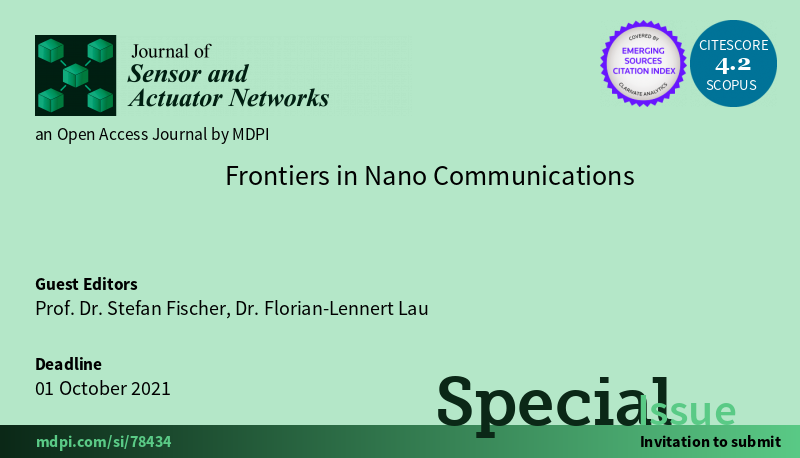Call for Papers
The field of nano-communication networks gained increased traction since its introduction in 2008. Nanonetworks tackle unique problems for which no other solution exists as of today. Among the research areas that could benefit from nanonetworks are medicine, pharmacology, synthetic biology, materials science, computer science, and many more. The interdisciplinary nature of the related research challenges has prompted the creation of new multidisciplinary work groups.
Aims of the Workshop
The first Workshop on Nanonetworks and Nanocomputation (WoNaN 2021) aims to further grow the research community in the nano-field worldwide and especially focuses on the German-speaking regions in Europe. The WoNaN 2021 highlights novel research results that have already been peer-reviewed to spread them in the networked systems community. In addition, all novel theoretical and experimental research contributions are welcome to be discussed and promoted at the workshop.
Topics of Interest
Topics of interest are (but are not limited to)
- Molecular communication
- Signal detection and signal design
- Mathematical and physical channel models
- Simulation tools for molecular communication
- Testbeds for molecular communication
- Electromagnetic communication
- Signal Coding, modulation and detection
- Nanomaterials and metamaterials
- EMC channel modeling
- Terahertz communication
- Localization/positioning
- Holistic network architectures
- Nanoscale communication protocols
- Wet-Lab experiment results with nanomaterials/nanostructures
- Simulation tools
- Methods for the generation of simulation constants
- Network simulation for extreme resource constraints
- Experimental demonstrations
- Nano-computation paradigms
- DNA-computing
- DNA-tile-based self-assembly systems
- Quantum-dot cellular automata
- Neural networks
- Chemical reaction networks
- Quantum-computing
- Alternative circuit technologies
- Nano-communication paradigms
- DNA-based communication systems
- Molecular communication
- FRETS
- Quantum entanglement
- Novel communication parameters and paradigms
- Applications and Scenarios for nanonetworks and nanotechnologies
- Unique selling points for nanonetworks
- Proposed nanonetworking solutions for currently unsolved problems
Workshop Chairs
- Jens Kirchner, Friedrich-Alexander-Universität, Germany
- Florian Lau, Universität zu Lübeck, Germany
- Lukas Stratmann, Technische Universität Berlin, Germany
Program Committee
- Ian Akyildiz, Georgia Institute of Technology, USA
- Christoph Alexiou, Universitätsklinikum Erlangen, Germany
- Thierry Arrabal, University of Franche-Comté, France
- Max Bartunik, Friedrich-Alexander-Universität, Germany
- Eugen Dedu, University of Franche-Comté, France
- Falko Dressler, Technische Universität Berlin, Germany
- Georg Fischer, Friedrich-Alexander-Universität, Germany
- Stefan Fischer, Universität zu Lübeck, Germany
- Wolfgang Gerstacker, Friedrich-Alexander-Universität, Germany
- Werner Haselmayr, Johannes Kepler University Linz, Austria
- Peter Hoeher, University of Kiel, Germany
- Eduard Jorswieck, Technische Universität Braunschweig, Germany
- Adam Noel, University of Erlangen-Nürnberg, Germany
- Gianluca Reali, Università degli Studi di Perugia, Italy
- Robert Schober, Friedrich-Alexander-Universität, Germany
- Andreas Springer, Johannes Kepler University Linz, Austria
- Harald Unterweger, Universitätsklinikum Erlangen, Germany
- Regine Wendt, Universität zu Lübeck, Germany
Important Dates
- Paper submission deadline: June 13th, 2021
- Acceptance notification: June 30th, 2021
- Camera ready papers: July 22nd, 2021
Submission
The first WoNaN is mainly accepting abstracts of about 0.5 pages in length with a short description of the topic that shall be presented, together with the planned title for the presentation. This type of submission is also available for already published results. Abstracts submitted to the WoNaN have to be based on previously submitted and peer-reviewed research. For the publication of novel research results at the WoNaN, we offer the opportunity to submit a short paper of 2–4 pages in length. Submitted papers with novel results undergo a very light-weight peer-review process.
Extended abstracts are limited to 4 pages including references, figures and tables (at least 10pt font, one-column format). LaTeX and Microsoft Word templates, as well as formatting instructions, are available online here: https://netsys2021.org/participation/
Authors should submit their papers electronically via the EasyChair online submission system under the following link: https://easychair.org/conferences/?conf=netsys2021 (select track: Workshop WoNaN).
We also want to point participants to an additional possibility to publish their work, namely the Special Issue “Frontiers in Nano Communications”:
